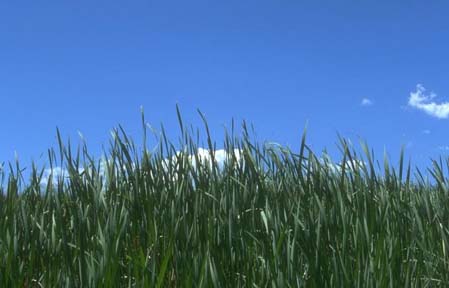Research Aids in Ryegrass Control in Wheat
Research Aids in Ryegrass Control in Wheat

In the 1980s, Jim Martin began getting questions about Italian ryegrass and how to control it in no-till corn production. Soon the questions drifted more and more toward controlling it in Kentucky’s wheat fields where it was causing considerable production problems.
Martin, a weeds science specialist with the University of Kentucky College of Agriculture, has spent many hours since then conducting studies to help farmers control this troublesome weed. Martin is a member of the UK Wheat Science Group, an interdisciplinary group of specialists who pool their knowledge to assist Kentucky’s wheat producers.
“Italian ryegrass is the most competitive cool season weed we have,” he said. “Wheat growers are especially concerned about Italian ryegrass since it infests an estimated 20 percent of the state’s wheat acres and spreads very easily. As much as an 85 percent yield loss has occurred as a result of ryegrass competition.”
Martin said there are estimates that one plant per square foot can reduce yields by four percent. So, to better understand the management of this weed he has conducted 14 studies evaluating application timing, tank mix antagonism and use of adjuvants with foliar-applied herbicides in wheat.
Italian ryegrass and wheat have similar maturity, so without good control measures the grass chokes out wheat in the field, lowering yields. At harvest ryegrass seeds are further dispersed across the field by the combine, he said.
Wheat is the third largest crop behind corn and soybeans in Kentucky with more than 300,000 acres planted each year for grain. Additional acres are planted annually for hay, silage and as a cover crop.
Preliminary estimates by the U.S. Agricultural Statistics Service show the 2006 wheat crop for Kentucky to be the highest yielding crop to date at 70 bushels per acre. This makes Kentucky’s yields among the top five in the country.
As wheat farmers prepare to plant their winter wheat again this fall, they are advised to remember to use sound weed management practices to keep Italian ryegrass from gaining strength in their fields.
Through Martin’s research a list of recommendations have been developed for farmers to use to control this weed. The published recommendations are available through UK Extension offices across the state. Recommendations are continually fine-tuned as new discoveries are made.
It is estimated that wheat growers gain a net savings of $8.13 per acre by following UK recommendations for controlling modest infestations of just three plants per square foot. While yield losses alone would exceed $25 per acre if these management recommendations are not followed, he said.
